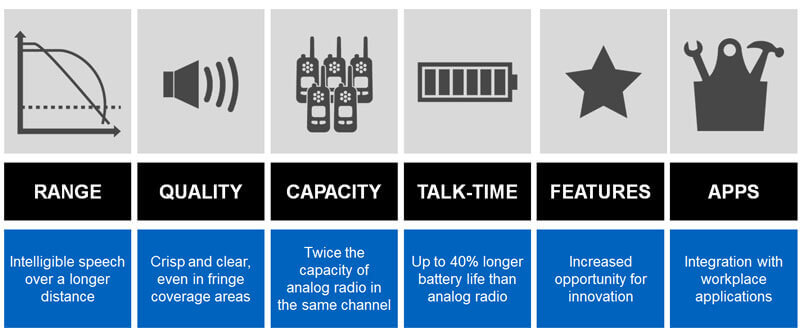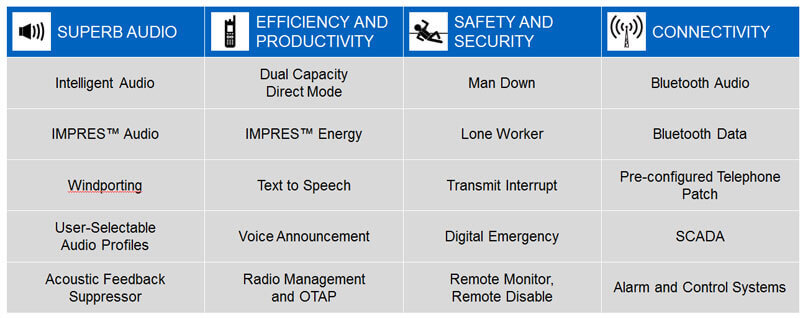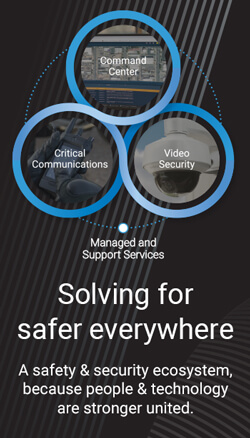MOTOTRBO: Why Digital Two-Way?

Why Digital Migration Is Essential To Your Business
Licensed, professional two-way radios have revolutionized communications for decades and continue to empower millions of people today. From schools to seaports, construction sites to convention halls, they are synonymous with reliability, durability and convenience.
Now professional radio is making a big leap forward — the move from analog to digital. Regulatory pressures and real-world needs are driving greater spectrum efficiency. Some legislators are even mandating that no new designs of two-way radios can be certified unless they have digital capability. This means that practically everyone in the future will use digital.
Digital radio offers many advantages over analog, including improved voice quality with greater coverage, better privacy, better battery life and more. That's why it's critical to consider digital migration now - so when you're ready to upgrade, you'll choose a system with the greatest benefits for the long term.

Better Voice Quality
Hear And Be Heard Clearly Without Noise, Static or Distortion
When you use a normal analog radio, every sound that's picked up by the microphone is transmitted. If there's a lot of background noise, it can be very difficult to understand you. Digital technology is purer. The software focuses purely on your voice, paying no attention to the machine clatter or the crowd noise around you. The result is exceptional voice clarity.
Radio interference creates static on an analog radio and makes the conversation less intelligible. Voice gets garbled and the message must be repeated. Because a digital radio has automatic error correction, it rebuilds voice sounds and maintains the clarity of the voice, even if a signal is badly corrupted. And since speech is digitally-encoded, you benefit from smarter capabilities, such as advanced software algorithms that can deliver clear voice in the most extreme conditions.
Better Capacity
Get Double The Calls From Every Channel
When it comes to spectrum efficiency, nothing matches digital technology. Digital is so bandwidth-efficient, it can accommodate two completely separate "channels" in one 12.5 kHz channel. As well as making more efficient use of precious radio spectrum, this also minimizes your licensing costs, especially as your business grows. With digital, you can immediately double the capacity of your existing 12.5 kHz channel and enable many more people to communicate without worrying about privacy or interference.
Better Coverage
Your Voice Stays Strong And Clear To The Ends Of Coverage
While all radio signals grow fainter as they go further out, the voice quality on analog radios degrades much more quickly. At the far edge of coverage, even though signal strength is similar, digital voice will be clear and intelligible while analog voice will be garbled and masked by static.
Digital radios have built-in error correction to eliminate static and ensure voice calls are heard clearly over a greater range. There's no interference, background noise or distortion. Digital maintains voice integrity to the very ends of the coverage area.
Better Battery Life
Communicate Longer On A Single Charge
Battery life is a big challenge for all mobile devices. But because digital technology is much more energy-efficient than analog, it reduces battery drain and improves talk time. Count on your battery to last up to 40% longer when you use a digital radio.
While both analog and digital radios consume about the same power in standby mode, once you start transmitting, digital radios are dramatically more efficient. This is critical for frequent and heavy users who depend on their radios to last the entire shift and can't stop to replace batteries or recharge radios.
When you choose Motorola, you choose generations of industry-leading quality, reliability and performance behind every radio. We have created two-way radios since the 1930s and continually innovate as the recognized leader in digital two-way radio technology. Our flexible portfolio of radios delivers the best of both worlds: great voice communications today and a path to even better digital voice communications when you're ready.
Emergency Call
A MOTOTRBO User in Distress Can Sound an Alarm to Summon Assistance
Digital Emergency can be triggered by a feature (e.g. Man Down), or by pressing the Emergency button or footswitch.
- When the emergency is initiated:
- Supervisor(s) receive(s) audio and visual alerts with the initiator’s ID.
- Initiating and supervisor radios enter Emergency Mode
- Calls contain an emergency indication, and are transmitted using Emergency Voice Interrupt.
The radio can be configured to do the following:
- Emergency Alarm only
- Emergency Alarm and Emergency Call
- Emergency Alarm with Voice to Follow
- Emergency Voice Interrupt for Emergency Alarm
- Emergency Voice Interrupt for Emergency Voice
Once the situation is resolved, the Emergency is cleared by the supervisor and initiator radios.
The Emergency Call feature is available for the MOTOTRBO XPR 2500, 3000e, 5000e, 7000e, and SL 7000e series radios.
Emergency Search Tone
Your Radio Will Sound a Loud Audio Alarm When it Enters Emergency Mode
When you trigger an Emergency Call, you may not be able to describe your location. If the alarm is triggered by a Man Down notification, you may not even be able to speak.
The Emergency Search Tone feature causes your radio to emit a continuous attention-grabbing sound as soon as it enters Emergency Mode. Rescuers can then come to your assistance by following the sound of the radio.
The tone also has some deterrence effect: For example if a security guard feels threatened by a crowd, the Emergency Search Tone will clearly signal to all present that reinforcements are on the way.
The Emergency Search Tone feature is available for the MOTOTRBO XPR 2500, 3000e, 5000e, 7000e, and SL 7000e series radios.
Indoor Location-Tracking
Your Radio Systems Tracks Your Workers, Even When They Are Inside the Building
This feature uses Bluetooth Low Energy (a mode of Bluetooth 4.0) in the latest MOTOTRBO radios to find the position of radios inside a building.
It relies on Bluetooth beacons ("iBeacons"), which are installed at known, fixed points around the building. These small, battery-operated units broadcast their unique identifier over Bluetooth.
The radio continually listens for iBeacons, and periodically sends a measurement report (beacon IDs and their signal strengths) over the MOTOTRBO data channel to a dispatcher application.
The application uses the report to calculate the likely position of the radio and displays it on a map in a similar way to GPS. The more beacons the radio reports, the more accurate the location fix will be.
The Indoor Location-Tracking optional feature is available for Next Generation MOTOTRBO radios that have integrated Bluetooth® 4.0, which include the MOTOTRBO 5000e and SL 7000e series radios.
Intelligent Audio
Your Radio Monitors Background Noise and Adjusts the Speaker Volume, So You Don’t Have to.
Loud means nothing without clarity. Some products may tout higher volume levels but then can only achieve them by increasing the voice distortion. MOTOTRBO XPR 2500, 3000e, 5000e, 7000e, and SL 7000e series radios deliver higher volume levels without significantly increasing the voice distortion. At the end of the day, we believe your ability to hear a call is most important, which is why MOTOTRBO radios have been specifically designed to hear that call in loud environments.
- Intelligent Audio is a receive-only feature that enhances the audibility of voice calls.
- It uses the radio or accessory’s microphone to monitor levels of background noise. When it detects that the radio is in a loud environment, the speaker volume is automatically increased. When in a quiet environment, the volume is automatically reduced.
- The radio’s volume can still be adjusted using the volume knob, but this feature eliminates the need for continual adjustment.
- Accessories are not required, but selected accessories are supported.
Low Voltage Battery Technology
Your Radio and Battery Work Together to Deliver Extremely Long Talk-Times
This feature increases the talk-time of portable radios without increasing battery size or weight.
MOTOTRBO radio power is nominally 7.4V, and a fully-charged battery delivers 7.4V. However, as the battery discharges, its output voltage drops. When the voltage drops to 6V, a standard radio and battery shut off, leaving a significant amount of energy remaining in the battery.
An enhanced MOTOTRBO radio with a low-voltage battery will continue to operate until the voltage drops to 5V, making more of the battery’s capacity available for use. The new “low voltage” batteries are still nominally 7.4V, but provide power down to 5V.
In this way, real world battery life can be increased to >27 hours.
Low voltage batteries will work with earlier-generation radios, but without increasing talk-time. New radios are compatible with standard batteries, but will not deliver significantly better battery life.
The Low Voltage Battery Technology feature is available for Next Generation MOTOTRBO radios, which include the MOTOTRBO SL 7000e series radios.
Text To Speech
Your Radio Can Now Read Text Out Loud: Channels, Zones, Functions, Messages and Work Order Tickets.
- This optional feature is an add-on to voice announcement available for the MOTOTRBO XPR 2500, 3000e, 5000e, 7000e, and SL 7000e. It removes the dependency on pre-recorded voice announcement files by installing speech synthesis software on the radio itself. Channel names, zones, programmable button functions, text messages and work order tickets are all read out loud to you.
- You can define a custom dictionary to ensure accurate readout of abbreviations and industry specific terminology, and choose from 27 different languages and several different voices.
- Programmable buttons can be configured to:
- Turn the feature on and off
- Repeat the last announcement
- All parameters are configurable using the CPS.
- This feature is chargeable. Activation requires the purchase of an Entitlement Identification (EID).
- All parameters are configurable using the CPS.
- This feature is chargeable. Activation requires the purchase of an Entitlement Identification (EID).
User-Selectable Audio Profiles
Your Radio’s Audio Characteristics Can Be Tuned to Suit Your Preference and Your Workplace
Everyone’s hearing is different. Depending on age and work history, you may have reduced sensitivity to certain frequencies. It doesn’t help when your work environment has variable background noise.
This feature allows you to customize the sound of the radio to suit your preference and work environment. You can select from different "ambience" settings and audio profiles.
Ambience Profiles:
- Default
- Loud: For loud environments: increases volume and noise suppression
- Work Group: For quiet environments: enables feedback suppression
Audio Profiles:
- Default
- Level 1: Mild compensation, for users exposed to industrial noise
- Level 2: Moderate compensation, for users exposed to industrial noise
- Level 3: Maximum compensation, for users exposed to industrial noise
- Treble Boost: For a "brighter" sound
- Mid Boost: For a more “nasal” tone – similar to legacy radios
- Bass Boost: For a deeper sound
The User-Selectable Audio Profiles feature is available for the MOTOTRBO XPR 2500, 3000e, 5000e, 7000e, and SL 7000e series radios.
Wi-Fi Software Updates
Complete No-Touch Radio Management
Your radios can now be completely updated, without the need to bring them back to base.
This feature uses the Wi-Fi interface on the latest generation of radios to enhance Over-the-Air Programming. You can now send large files to your radios – for example new radio firmware, voice announcement files and splash screen images.
All the functionality of Over-the-Air Programming is available over Wi-Fi. Updates can be batch-programmed and scheduled for a particular date. Radios continue to operate as normal while they are downloading updates.
Remote updates save the time and cost of locating all radios, bringing them to a central location and disrupting normal business operations.
The Wi-Fi Software Updates feature is available for Next Generation MOTOTRBO radios, which include the MOTOTRBO SL 7000e series radios.











